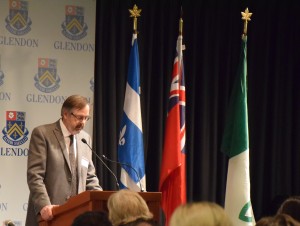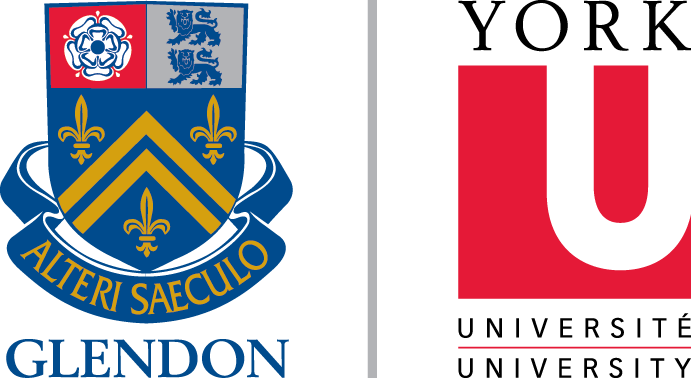
François Rocher, School of Political Studies, University of Ottawa
As part of its 50th anniversary celebrations, Glendon College organized a discussion day on la francophonie on Friday, December 4. Entitled “Québec-Ontario,” this conference set out to address the challenges and opportunities arising from 400 years of francophone immigration in the province. One of these panels, “The Canadian and International francophonie,” was led by journalist and diplomat Jean-Louis Roy, President of Partenariat international, and featured a number of guest speakers: lawyer Jacques Gauthier; Mohamed Ghaleb, Office of the French Language Services Commissioner; Selma Toprak, Cultural Attaché for the Consulate General of France in Toronto; and François Rocher, a full professor at the University of Ottawa’s School of Political Studies.
Mr. Gauthier spoke about the achievements that have been realized in Ontario’s francophonie. With the help of other jurists, he is credited in particular with creating Le Guide du praticien, a resource that equips lawyers to present their cases in French.
“It is my hope that a great many universities will begin offering opportunities to study civil law or common law, as McGill and the University of Ottawa are already doing,” he said, referring to Canada’s bijural situation. He then noted the creation of the Lycée Français in 1995 and its ever-increasing enrolment. He did, however, express his concerns over the fact that Ontario’s francophonie depends on a healthy Quebec.
Mr. Ghaleb was the second panellist to address the topic. “Ontario is a pioneer in terms of adopting an inclusive definition of what a francophone is,” he pointed out. Indeed, people who know French and speak it at home are now considered to be francophones even if French is not necessarily their first language. “Ontario’s francophone population is expanding rapidly, as is also the case in the rest of the world,” he said reassuringly. In his view, there is cause to be very hopeful for this community. However, Mr. Roy insisted on tempering this remark, evoking “the huge language upheaval in Africa.” “Admitting the plurality of linguistic identities is a factor in the development of la francophonie,” explained Selma Toprak. Mr. Roy supported this statement, defining la francophonie as “the French language and its partner languages.”
In closing the discussion, François Rocher stated that “the international francophonie needs to be understood in its constitutive diversity.” La francophonie is not, in his view, a defined place; rather, it should be understood as “an undertaking to reconquer, to affirm and to acknowledge a state of oppression.” Finally, he noted the importance of its linguistic context because the language, culture and identity depend on it. “Politically speaking, la francophonie – with the exception of France – consists of minority groups that mobilize themselves in a specific context,” he added. “La francophonie must be apprehended first as an approach, and then as an institution.” Consequently, it is necessary to participate in shared projects with all of the world’s francophonies.
By Gabrielle Drouin, published in Le Métropolitain on December 31, 2015


